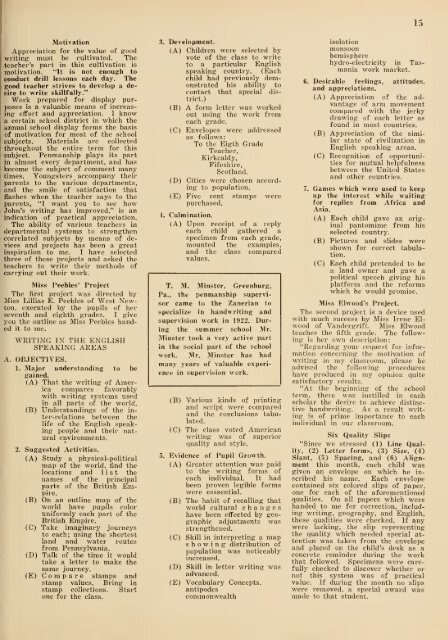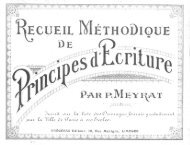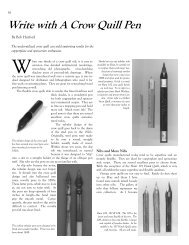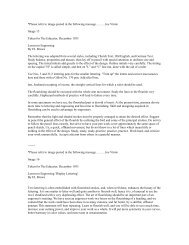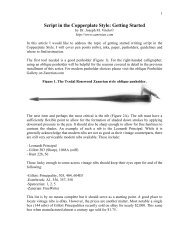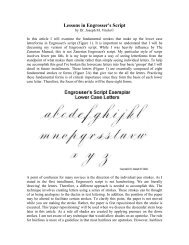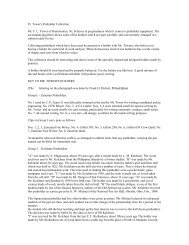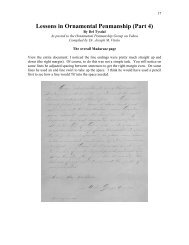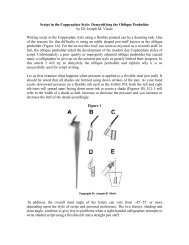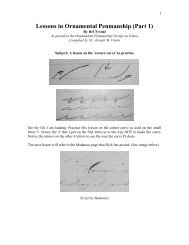The Educator (Volume 45) - IAMPETH
The Educator (Volume 45) - IAMPETH
The Educator (Volume 45) - IAMPETH
Create successful ePaper yourself
Turn your PDF publications into a flip-book with our unique Google optimized e-Paper software.
Motivation<br />
Appreciation for the value of good<br />
writing must be cultivated. <strong>The</strong><br />
teacher's part in this cultivation is<br />
motivation. "It is not enough to<br />
conduct drill lessons each day. <strong>The</strong><br />
good teacher strives to develop a desire<br />
to write skillfully."<br />
Work prepared for display purposes<br />
is a valuable means of increasing<br />
effort and appreciation. I know<br />
a certain school district in which the<br />
annual school display forms the basis<br />
of motivation for most of the school<br />
subjects. Materials are collected<br />
throughout the entire term for this<br />
subject. Penmanship plays its part<br />
in almost every department, and has<br />
become the subject of comment many<br />
times. Youngsters accompany their<br />
parents to the various departments,<br />
and the smile of satisfaction that<br />
flashes when the teacher says to the<br />
parents, "I want you to see how<br />
John's writing has improved," is an<br />
indication of practical appreciation.<br />
<strong>The</strong> ability of various teachers in<br />
departmental systems to strengthen<br />
correlated subjects by means of devices<br />
and projects has been a great<br />
inspiration to me. I have selected<br />
three of these projects and asked the<br />
teachers to write their methods of<br />
carrying out their work.<br />
Miss Peebles' Project<br />
<strong>The</strong> first project was directed by<br />
Miss Lillias E. Peebles of West Newton,<br />
executed by the pupils of her<br />
seventh and eighth grades. I give<br />
you the outline as Miss Peebles handed<br />
it to me.<br />
WRITING IN THE ENGLISH<br />
SPEAKING AREAS<br />
A. OBJECTIVES.<br />
1. Major understanding to be<br />
gained.<br />
(A) That the writing of America<br />
compares favorably<br />
with writing systems used<br />
in all parts of the world.<br />
(B) Understandings of the inter-relations<br />
between the<br />
life of the English speaking<br />
people and their natural<br />
environments.<br />
2. Suggested Activities.<br />
(A) Study a physical-political<br />
map of the world, find the<br />
locations and list the<br />
naines of the principal<br />
parts of the British Empire.<br />
(B) On an outline map of the<br />
world have pupils color<br />
uniformly each part of the<br />
British Empire.<br />
(C) Take imaginary journeys<br />
to each; using the shortest<br />
land and water routes<br />
from Pennsylvania.<br />
(D) Talk of the time it would<br />
take a letter to make the<br />
same joui-ney.<br />
(E) Compare stamps and<br />
stamp values. Bring in<br />
stamp collections. Start<br />
one for the class.<br />
3. Development.<br />
(A) Children were selected by<br />
vote of the class to write<br />
to a particular English<br />
speaking country. (Each<br />
child had previously demonstrated<br />
his ability to<br />
contact that special district.)<br />
(B) A form letter was worked<br />
out using the work from<br />
each grade.<br />
(C) Envelopes were addressed<br />
as follows:<br />
To the Eigth Grade<br />
Teacher,<br />
Kirkcaldy,<br />
Fifeshire,<br />
Scotland.<br />
(D) Cities were chosen according<br />
to population.<br />
(E) Five cent stamps were<br />
purchased.<br />
4. Culmination.<br />
(A) Upon receipt of a reply<br />
each child gathered a<br />
specimen from each grade,<br />
mounted the examples,<br />
and the class compared<br />
values.<br />
T. M. Minster, Greenburg,<br />
Pa., the penmanship supervi-<br />
sor came to the Zanerian to<br />
specialize in handwriting and<br />
supervision work in 1922. During<br />
the summer school Mr.<br />
Minster took a very active part<br />
in the social part of the school<br />
work. Mr. Minster has had<br />
many years of valuable experience<br />
in supervision work.<br />
(B) Various kinds of printing<br />
and script were compared<br />
and the conclusions tabulated.<br />
(C) <strong>The</strong> class voted American<br />
writing was of superior<br />
quality and style.<br />
5. Evidence of Pupil Growth.<br />
(A) Greater attention was paid<br />
to the writing forms of<br />
each individual. It had<br />
been proven legible forms<br />
were esssential.<br />
(B) <strong>The</strong> habit of recalling that<br />
world cultural changes<br />
have been effected by geographic<br />
adjustments was<br />
strengthened.<br />
(C) Skill in interpreting a map<br />
showing distribution of<br />
population was noticeably<br />
increased.<br />
(D) Skill in letter writing was<br />
advanced.<br />
(E) Vocabulary Concepts,<br />
antipodes<br />
commonwealth<br />
15<br />
isolation<br />
monsoon<br />
hemisphere<br />
hydro-electricity in Tasmania<br />
work market.<br />
6. Desirable feelings, attitudes,<br />
and appreciations.<br />
(A) Appreciation of the advantage<br />
of arm movement<br />
compared with the jerky<br />
drawing of each letter as<br />
found in most countries.<br />
(B) Appreciation of the similar<br />
state of civilization in<br />
English speaking areas.<br />
(C) Recognition of opportunities<br />
for mutual helpfulness<br />
between the United States<br />
and other countries.<br />
7. Games which were used to keep<br />
up the interest while waiting<br />
for replies from Africa and<br />
Asia.<br />
(A) Each child gave an original<br />
pantomime from his<br />
selected country.<br />
(B) Pictures and slides were<br />
shown for correct tabulation.<br />
(C) Each child pretended to be<br />
a land owner and gave a<br />
political speech giving his<br />
platform and the reforms<br />
which he would promise.<br />
Miss Elwood's Project.<br />
<strong>The</strong> second project is a device used<br />
with much success by Miss Irene Elwood<br />
of Vandergrift. Miss Elwood<br />
teaches the fifth grade. <strong>The</strong> following<br />
is her own description:<br />
"Regarding your request for information<br />
concerning the motivation of<br />
writing in my classroom, please be<br />
advised the following procedures<br />
have produced in my opinion quite<br />
satisfactory results.<br />
"At the beginning of the school<br />
term, there was instilled in each,<br />
scholar the desire to achieve distinctive<br />
handwriting. As a result writing<br />
is of prime importance to each<br />
individual in our classroom.<br />
Six Quality Slips<br />
"Since we stressed (1) Line Quality,<br />
(2) Letter forms, (3) Size, (4)<br />
Slant, (5) Spacing, and (6) Alignment<br />
this month, each child was<br />
given an envelope on which he inscribed<br />
his name. Each envelope<br />
contained six colored slips of paper,<br />
one for each of the aforementioned<br />
qualities. On all papers which were<br />
handed to me for correction, including<br />
writing, geography, and English,<br />
these qualities were checked. If any<br />
were lacking, the slip representing<br />
the quality which needed special attention<br />
was taken from the envelope<br />
and placed on the child's desk as a<br />
concrete reminder during the work<br />
that followed. Specimens were carefully<br />
checked to discover whether or<br />
not this system was of practical<br />
value. If during the month no slips<br />
were removed, a special award was<br />
made to that student.


